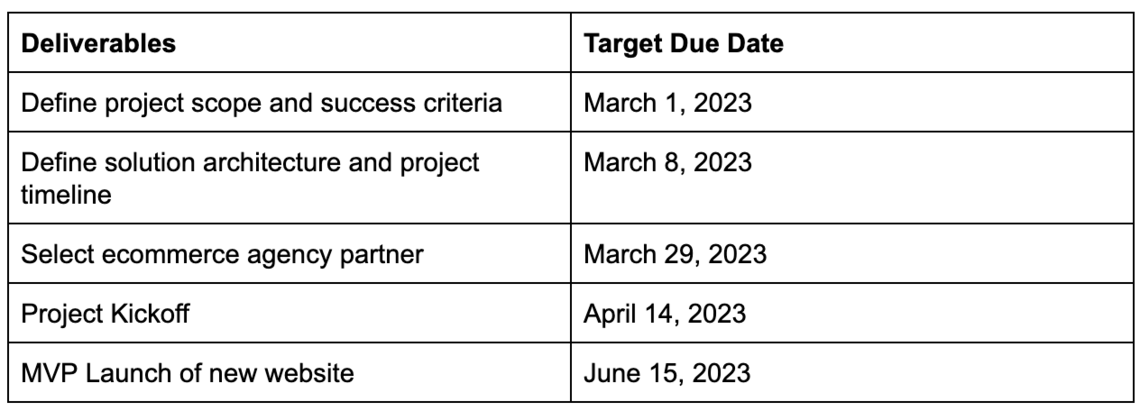Blog
How to Write a Business Case for an Ecommerce Website
An ecommerce website is a huge investment. Here’s how to write a strong business case to build one.

An ecommerce website is a huge investment. Here’s how to write a strong business case to build one.


May 8th, 2023
An ecommerce website is a huge investment. Here’s how to write a strong business case to build one.
I’m sure you’ve seen the stats. Over 218 million people plan to shop online in 2023. E-commerce sales are set to account for almost 24% of all retail sales. B2C sales will account for $3.5 trillion in sales by 2024 with B2B sales following a very similar trajectory. Why wouldn’t you drop everything and build an ecommerce website today?
That’s very convincing. Well, at least to you and me. But selling your boss on the idea of making a costly investment in an ecommerce website will take more than just a few stats. There’s a lot of writing and research in your future, and what you’ll ultimately end up with is a compelling business case for your site, which begins with an executive summary of the project.
Every ecommerce business plan case should start with a strong executive summary that provides a high-level overview of your proposed project. You’ll get into the finer details later in your document, but this is your first opportunity to show your boss that you’ve done your homework.
Your executive summary can (and should) be brief, but make sure to touch on the following topics:
Why do you believe an ecommerce website is necessary?
What operational opportunity does an ecommerce website represent to your business?
What sales and growth opportunity does an ecommerce website represent to your business?
What KPIs will you use to measure the success of the website?
What do you estimate the project will cost in real dollars and internal resources?

At this stage of the exercise, you won’t have financial approval. But this is an important step in getting it from your accounting department.
Since most businesses won’t just fork over money for any online store business plan, this is your opportunity to show your boss that you understand the financial implications of investing in a website. Be sure to answer the following questions about your ecommerce business plan—and more importantly, be prepared to answer supplemental questions from your manager and finance department.
Have you compared the overall cost of this project to the financial benefits we should gain from this website?
What is the estimated return on investment? Will we see this in actual dollars, sales pipeline, or an increase in brand awareness?
Have you considered any other alternative business plan examples? If so, what are they and why is an e-commerce website the right option?
Estimating the financial benefits and opportunity of an ecommerce website can be difficult, but there is a basic formula which most businesses can use as a base-line:
Website Traffic x Conversion Rate x Average Order Value = Revenue
If you have an existing website, you may have some good data to work from, but in many cases, these numbers will require some research and, let's be honest, some guestimation. A good place to start is by putting together a list of competitors, considering the tools they are using, and getting insight into how busy their websites are. Some tools you can use to analyze your competition include:
Now let’s talk about the nitty-gritty of your e-commerce website. This is where you finally get to show your boss that you have a plan for tackling such a huge project.
The basic skeleton of your project outline should include the following sections.
In this section, give your boss (or anyone else who’s reading it) a clearer picture of what brought you to this point. Provide the reader with a brief, but detailed explanation of the business challenges you’re trying to solve and the opportunity to solve them with an online store business plan.
This section needs to answer one basic question: Why are even talking about an ecommerce website business plan?
As we’ve discussed in previous posts, your ecommerce website can solve an endless combination of business challenges. Avoid the temptation to discuss them all in this section and focus on one or two main business objectives. For example, you might say the following:
Our competition is heavily invested in ecommerce and we are missing a major opportunity to grow our business by not investing in and optimizing our website for ecommerce.
If we launch a modern ecommerce website and are able to achieve similar levels of website traffic to our competition, I estimate that we could see between $x and $y in additional monthly revenue.
This should be easy, right? You’ve already discussed several benefits of building an ecommerce website in other sections of your business case. Summarize them again here, but more importantly, document some of the limitations of building your e-commerce website.
Your boss doesn’t expect any ecommerce website business plan to be a silver bullet solution. If you try to convince them that an ecommerce website will make everyone’s dreams come true without any obstacles, that’s a clear path to rejection.
There are a lot of ecommerce options on the market and this part of your business plan may require some research. There are a wide range of ecommerce platforms available to merchants, and they all have varying strengths and weaknesses to consider. For example, Shopify and BigCommerce are some of the top choices for small and big ecommerce brands alike as they’re both powerful platforms that offer many options for customization.
Selecting the right technology for your business requires going through an in-depth process, even after getting buy-in for the overall project. Regardless of where you are in the process of building your solution architecture, keep this section straightforward by answering the following questions. We’ll do so in the context of choosing an ecommerce platform.
Which ecommerce platforms have you evaluated?
What are the benefits of each platform?
What are the potential cons of each platform?
How much does each platform cost?
Which option do you recommend choosing?
This is an ideal opportunity to evaluate ecommerce partners like Sunrise Integration. Want some of the answers to the questions we posed above? Reach out to us to chat about your ecommerce website project to see how we can help.
To this point, we’ve discussed a lot of high-level details of your ecommerce website. In this section, walk your boss through each step of your implementation plan and include deliverables and target dates.
Your implementation plan for an ecommerce website might look something like this:

Your implementation plan will likely involve a much larger list of tasks, which gives you a lot to think through on your own and with your team. Doing this work upfront to showcase your ecommerce business ideas is worth the hassle. It’s much easier (and more productive) to change an existing schedule rather than trying to build an ecommerce website on the fly.

Don’t just launch it and leave it–you should have a post-launch marketing plan for your website to ensure it gains as much traction as possible. Here are a few ideas and concepts to be thinking about:
Email and SMS Marketing
How will you grow your email or SMS subscriber list?
Segment your contacts and personalize your content
Implement automation (e.g. welcome series, abandoned cart, post purchase and beyond)
Your Social Media Strategy
What social media platforms make sense for your business?
Do you plan on selling through social media channels?
Create a social media calendar to make sure you’re posting consistently.
Track engagement and set realistic goals.
Search Engine Optimization
Ensure that your ecommerce agency is incorporating SEO best practices in the development of your website.
Have a content strategy that provides value to prospective customers. Consider things like writing a press release, regular blog posts or recording How-To videos.
Be familiar with Google Analytics to help you track where your traffic is coming from. Remember SEO is a journey and tools like Google Analytics will help you figure out what is working and stay on track.
Create a special promotion for the launch
Implement a conversion rate optimization (CRO) strategy
Your business case is an opportunity to show your manager that you’ve thought through the potential benefits and pitfalls of building an ecommerce website. While you don’t need to belabor the point(s), make a list of each risk or roadblock you anticipate and include contingency business plan examples for each of those items.
Writing a strong business case will take a considerable amount of time and effort. It will also be one of the more tedious documents you work on as part of your ecommerce website project. You may have already guessed that after reading this blog post.
However, it’s worth the effort and any headaches it may cause. Doing this work upfront will force you to think through the most miniscule details of building an ecommerce website and ultimately ensure that you maximize your investment.
Want to learn more about how Sunrise Integration can help your ecommerce website become a reality? Get in touch with us to learn more.